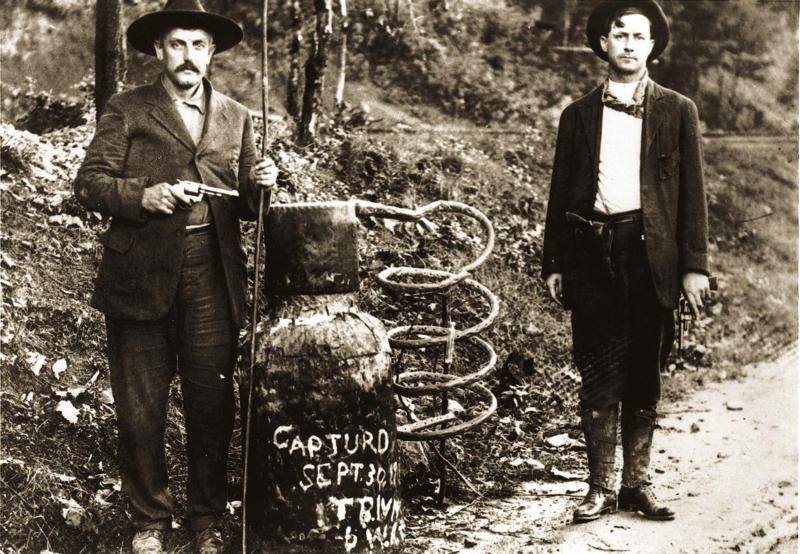The practice of moonshining has a long and complicated history in the Appalachian Mountains. Many folks think of moonshiners as the sneaky-but-lovable hillbilly rascal who comes across as a little shady but mostly harmless, much like the infamous Popcorn Sutton. This simplistic perception doesn’t tell the full story as moonshine operations of yesteryear often bore a strong resemblance to organized crime syndicates akin to the mafia.
The origin of the name “moonshiner” is widely believed to be due to it being made after dark “by the light of the moon” to avoid detection from law enforcement. The name is thought to have been brought over from England as a version of their similar-meaning word “moonraker.” Other names given to the various types of homemade liquors are corn squeezin’s, hooch, mountain dew and white lightning.

A copper pot was most commonly rigged into a moonshine still to ferment a combination of corn, yeast, sugar and water (or other ingredients) by heating it to make the potent liquor. The recipes for the liquor originated from the many Scots-Irish immigrants who moved into the Appalachian Mountains.
Early moonshiners mostly made their homebrewed concoctions for their personal use. More and more people entered the trade once it grew into a profitable business. The illegal moonshine trade boomed following the enactment of the 18th Amendment to the Constitution in 1920, which began a 13 year dry spell from alcohol known as Prohibition. Prohibition combined with the onset of the Great Depression in 1929 made moonshining an increasingly attractive, albeit illegal, option to make money for many already impoverished Appalachians.

Whereas mafias are often referred to as “crime families,” many moonshining operations were literally made up of family members. The batches of moonshine had to be brewed, bottled and then transported to market leading to jobs for dad, mom, son, daughter, cousin, grandpa, etc.
Cars were souped up to outrun the police to get the liquor out of the mountains. Commonly known as ridge runners, these bootleggers would load up their vehicle with moonshine, cover it up to try to hide it and then speed down the winding mountain roads. Ridge running of the enhanced cars eventually led directly to the creation of NASCAR.
The federal government has long attempted to crack down on moonshining. Government officials known derisively as “revenooers” have historically been the archenemy of moonshiners. The name revenooer stems from government attempts to enforce tax revenue laws as an excuse to arrest the moonshiners.

Local citizens have had mixed relations with moonshiners through the years as many of them have been neighbors and customers. Appalachians in general have long resented government intervention into their lives and considered revenooers an extension of that meddling, even if they themselves didn’t participate in moonshining. There was less sympathy for many moonshiners during the Prohibition/Great Depression years. The high profit margins had led many moonshiners to become increasingly hostile and threatening in protecting their “business” by intimidation and other aggressive means, leading to local backlash against them in many places.

The number of homebrewing moonshiners has dropped considerably in recent years for various reasons. One factor has been the shrinking profit margins on moonshine which has made growing marijuana and the illegal prescription drug trade more lucrative industries. Unlike drug dealers, the remaining moonshiners are generally tolerated, and in many cases beloved, by the local public – aside from people who have strong religious or similar moral objections.
I used to know several practitioners of the art of moonshining but since moving I’ve lost all my contacts. Fortunately, I live within striking distance of the “Moonshine Capital of the World” Cocke County, Tennessee, and hope to make new friends…for medicinal purposes, of course.
